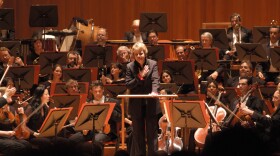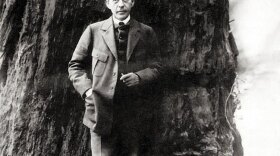
Marin Alsop
Marin Alsop artist page: listen to interviews, features and music archived at NPR Music.
Featured stories:
- Marin Alsop on Music: Mahler's Fifth Symphony: The Everest of Music (Interviews & Profiles)
- Marin Alsop on Music: Rimsky-Korsakov Lets the Symphony Tell the Story (Interviews & Profiles)
- Marin Alsop on Music: Marin Alsop: Orbiting the Symphonies of Brahms (Interviews & Profiles)
- Marin Alsop on Music: Dvorak's Symphonic Journey to the 'New World' (Interviews & Profiles)
-
The groundbreaking conductor — the first woman to lead a major American Orchestra — reflects on 14 years as music director of the Baltimore Symphony.
-
For nearly 200 years, Beethoven's epic Ninth Symphony, with its powerful "Ode to Joy," has inspired millions. Now conductor Marin Alsop takes it on a world tour.
-
Conductor Marin Alsop muses on the power of ballet and her memories of watching choreographer George Balanchine bring the music of Tchaikovsky to life with the New York City Ballet.
-
At a time when we have become immune to shock and where hyperbole rules, Marin Alsop argues that Mahler's Sixth Symphony provides the perfect soundtrack.
-
After 25 years directing the contemporary music festival in California, Marin Alsop bids farewell with Lola Montez Does the Spider Dance, a new piece composed for her by John Adams.
-
Baltimore Symphony Orchestra Music Director Marin Alsop muses on both the Russian and American sides of Sergei Rachmaninoff and his Third Symphony.
-
Conductor Marin Alsop explains how her mentor, Leonard Bernstein, probes the essential questions of humanity in his comic operetta Candide.
-
After he was publicly denounced, Shostakovich rebounded with the compelling and calculated Symphony No. 5. The music supplied a soundtrack for the Soviet people and satisfied the apparatchiks.
-
Mystical Russian composer Alexander Scriabin saw music, heard colors and wrote music that goes from ecstasy to frenzy. Baltimore Symphony conductor Marin Alsop explores Scriabin's best-known piece.
-
Inspired by Shakespeare, Mendelssohn captures all the magic and frivolity in the music he wrote for the Bard's otherworldy play.










